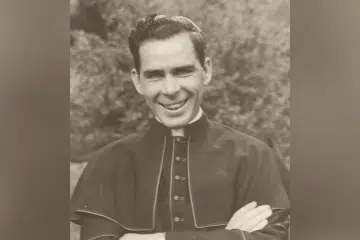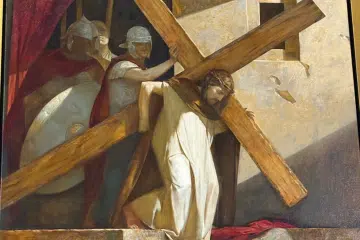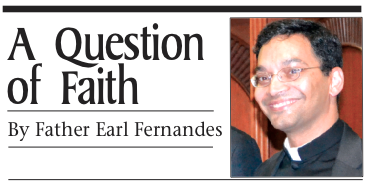Did Pope Francis change church teaching on homosexuality?
Dear Father: I keep hearing that Pope Francis changed Church teaching on homosexuality with his question, “Who am I to judge?” Is that true?
Dear Reader: Pope Francis did not change church teaching [cf. Catechism of the Catholic Church (2357-2359]. His comment — “Who am I to judge?” —must be understood in the context of the press conference he gave while returning from World Youth Day in Rio.
During the press conference, Brazilian journalist Patricia Zorzan asked Francis why he didn’t speak about abortion and same-sex marriage. He answered: “The church has already spoken quite clearly on this. It was unnecessary to return to it, just as I didn’t speak about cheating, lying, or other matters on which the church has clear teaching!”
When she pressed further, he replied: “Yes, though it wasn’t necessary to speak of it, but rather of the positive things that open up the path to young people. Isn’t that right! Besides, young people know perfectly well what the church’s position is.”
Later, the Italian Ilze Scamparini asked him two questions dealing with the allegations regarding homosexual behavior by Msgr. Ricca when he was serving as a Vatican diplomat and with confronting the gay lobby. In this limited context Pope Francis uttered, “Who am I to judge?”
With respect to Msgr. Ricca, the pope answered that a preliminary investigation had been conducted and found no evidence. The pope did not say that homosexual acts were not sinful; he claimed simply no evidence of these allegations. The pope added: “I see that many times in the church, over and above this case, but including this case, people search for “sins from youth,” for example, and then publish them. They are not crimes, right? Crimes are something different: the abuse of minors is a crime. No, sins. But if a person, whether it be a lay person, a priest or a religious sister, commits a sin and then converts, the Lord forgives, and when the Lord forgives, the Lord forgets and this is very important for our lives.”
The important point is that irrespective of our state in life- or even one’s sexual orientation- there is always the possibility of conversion to the Lord. God offers us the gift of forgiveness and love- the gift of the Holy Spirit (CCC 734). If any of the allegations of homosexual behavior were true, these would be intrinsically disordered acts (CCC 2357) and sinful. Still, one has to allow for the possibility of repentance, a return to friendship with God and of life according to the Spirit. This is the general pattern of conversion from any sin and applies to each of us.
The second question dealt with the so-called gay lobby. Here the pope distinguished between a person being gay and a homosexual lobby, which he said was not good. He then added: “If someone is gay and is searching for the Lord and has good will, then who am I to judge him? The Catechism of the Catholic Church explains this in a beautiful way, saying, ‘no one should marginalize these people for this, they must be integrated into society.’ The problem is not having this tendency, no, we must be brothers and sisters to one another, and there is this one and there is that one.”
Church teaching states that the homosexual inclination (though not the person) is disordered but not sinful. The Holy Father paraphrased paragraph 2358 of the Catechism which speaks of the respect owed to persons who experience same-sex attraction: “They must be accepted with respect, compassion, and sensitivity. Every sign of unjust discrimination in their regard should be avoided. These persons are called to fulfill God’s will in their lives, and, if they are Christians, to unite to the sacrifice of the Lord’s cross the difficulties they may encounter from their condition.”
This teaching must become better known and lived by Catholics. Rather than change church teaching, the pope referenced church teaching. The pope wanted to emphasize respect for persons. The Catechism (2359) speaks of the call of such persons (like all persons) to chastity and Christian perfection, which are achieved through the virtues, friendship, prayer and sacramental grace. The “searching for the Lord” and “good will” is the response to this call. Even if our response is sometimes less than perfect, we gradually grow in faith and in virtue. We cannot neglect the duty to seek the face of the Lord.
Furthermore, what the Catechism (2358-2359) says could be said of each person. As persons, having equal dignity, we should not to be reduced to our sexual orientation. We are, as Pope Francis says, to be “brothers and sisters to one another.”
In its 1986 letter “On the Pastoral Care of Homosexual Persons” (n. 16), the Congregation for the Doctrine of the Faith emphasized true equality — the equal dignity of persons: “The human person, made in the image and likeness of God, can hardly be adequately described by a reductionist reference to his or her sexual orientation. Every one living on the face of the earth has personal problems and difficulties, but challenges to growth, strengths, talents and gifts as well. Today, the church provides a badly needed context for the care of the human person when she refuses to consider the person as a “heterosexual” or a “homosexual” and insists that every person has a fundamental Identity: the creature of God, and by grace, his child and heir to eternal life.”
Editor’s Note: Father Earl Fernandes is dean of Mount St. Mary’s Seminary and the Athenaeum of Ohio, where he is assistant professor of moral theology. To ask Fr. Earl a question about the Catholic faith, send an email to [email protected] or to The Catholic Telegraph, 100 E. Eighth St., Cincinnati, OH 45202.
This “A Question of Faith” column originally appeared in the June 2014 print edition of The Catholic Telegraph.














